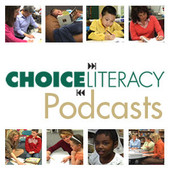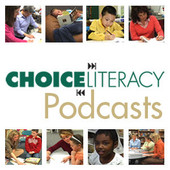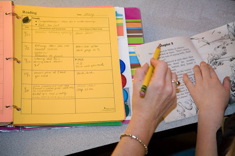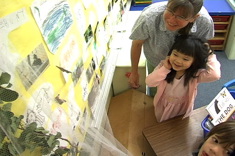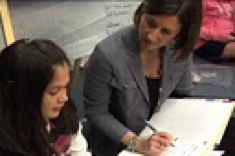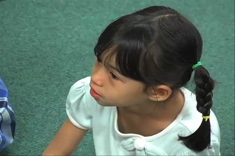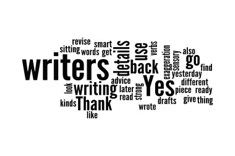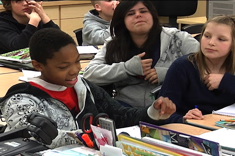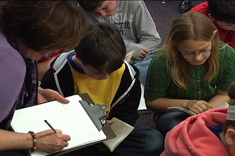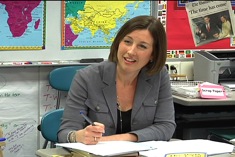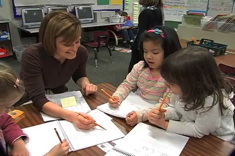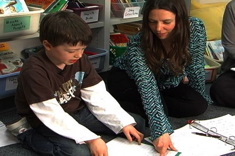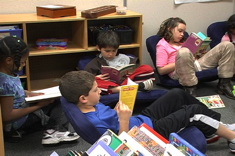Assessment Tools
Making sense of the enormous amount of student data in any classroom or school is probably the biggest challenge we face individually and in our school communities. Here you'll find everything from one-page templates created by teachers for use in their classrooms to videos of staff teams poring over large data sets. We don't have all the answers, but we do provide tools to help you ask better questions as you evaluate students and talk about assessments with your colleagues.
Latest Content
The Power of Checklists in Primary Literacy Workshops
Knowing our most sophisticated professions use checklists to get it right, Clare Landrigan and Tammy Mulligan share and explain checklists that work well for students.
More Thoughtful Test Preparation: A Conversation with Patrick Allen (PODCAST)
How can teachers connect thoughtful literacy workshops with test preparation? Patrick Allen has suggestions in this podcast.
Sense of Little Engines
Heather Rader writes about "agency" – the challenge of letting students and teachers take charge of their learning. In concrete examples from a third-grade classroom and a professional development scoring session with teachers, Heather shares the subtleties of learning to trust, wait, and celebrate when learners of any age are responsible and independent.
Clare Landrigan and Tammy Mulligan on Assessments, Data, and Balance (PODCAST)
As the data pours in throughout the year, it’s hard to keep a sense of balance and purpose. Tammy Mulligan and Clare Landrigan chat with Franki Sibberson in this podcast about data and balance.
Language in the Classroom: Using a Recorder as a Teaching Resource
Ruth Shagoury provides tips and strategies for analyzing language in the classroom.
Spring Slump
Audrey Alexander takes a close look at a couple of the students in her self-contained resource room, and finds the observations renew her flagging energy.
Balancing Assessments Through Better Classroom Notes
Clare Landrigan and Tammy Mulligan explain how literacy coaches can validate and support teachers by helping them refine their classroom notetaking skills.
Seven Minutes of Listening
What can we learn by listening closely to children? Plenty — Andie Cunningham shares insights from seven minutes with a young English language learner.
Assessment Conferences: Listening to and Learning from Our Students
Research, decide, and teach – Clare Landrigan and Tammy Mulligan use Lucy Calkins’ wise advice in assessment conferences with children.
Guiding Readers in Kindergarten: A Planning and Assessment Template
If you’re considering guided reading groups in your kindergarten classroom, you’ll want to read Mandy Robek’s advice for getting started and keeping track with a simple planning and assessment form.
Draft Stamps: Moving Learners at All Levels Forward
The draft stamp is a simple tool for tracking and accountability, no matter the age of the learner.
Language Patterns: Reflecting with Transcripts and Wordle
If you are familiar with Wordle, you already know it is a great free tool on the web for creating “word clouds” – visual representations of language. Heather Rader uses Wordle in her literacy coaching to give new and veteran teachers a succinct and powerful visual representation of their teaching language.
Uncovering Reading Behaviors
Teachers value the assessment of student skills and needs that come from close observation in classrooms, but may not know how to focus those observations. Ruth Shagoury documents some of those behaviors that put students on the path of becoming accomplished independent readers in a middle school classroom.
It’s Not the Assessment — It’s How You Use It
Clare Landrigan and Tammy Mulligan discuss ways teachers can get the most out of any assessment data collected early in the year, moving beyond numbers for insights into how to structure and target instruction.
Assessment Beyond Levels: The Reading Grid
Is there a great divide in your classroom between numerical data from assessments and your anecdotal notes? Cathy Mere bridges the gap with her class reading grid, a nifty tool for recording and analyzing a whole classroom’s worth of student assessment data on one page. A template is included.
Making Data Analysis a Motivating and Worthwhile Process
Tammy Mulligan and Clare Landrigan have ideas for staying motivated while analyzing data. If you’re drowning in assessments, there are a few lifelines in this piece.
Triangulating: The Importance of Multiple Data Points When Assessing Students
No data point for any child stands alone. Clare Landrigan and Tammy Mulligan write about the importance of triangulating data when looking at student assessments, and in the process affirm the value of classroom observations.
Creating Data Teams
Literacy leaders are spending more and more time organizing, compiling, and storing assessment data, often leaving little time to analyze the findings with teachers. Clare Landrigan and Tammy Mulligan explain the value of enlisting tech support to assist with the data load.
Understanding Students in Intervention Programs
Using data to make wise decisions about students who are struggling is one of the most important tasks in schools. In this series, Clare Landrigan and Tammy Mulligan take you through the process of linking data to instruction plans in intervention programs.
Sharing Data with Families at Parent/Teacher Conferences
How can teachers use assessment data in conferences with parents, without overwhelming them with information? Clare Landrigan and Tammy Mulligan recommend a "data snippets" approach.
Implementing RTI: Keeping Students at the Heart of Our Conversations
Jennifer Allen provides some prompts for staff discussions about Response to Intervention to help you connect long-term goals and beliefs with short-term strategies.
Assessment in Writing Workshops: Considering Students
What does formative assessment look like in practice? Katie DiCesare shares her assessment insights in these brief case studies of two first-grade students.
Getting and Giving Student Feedback
How can we help students be more reflective in our classrooms, giving us the feedback we need to make them better places for learning? Heather Rader has suggestions.
Countdown: Keeping Children at the Center of My Plans for the New Year
Cathy Mere reminds us that the excitement of facing new students is always tempered and enriched by the lessons from last year’s students that we carry with us.
The DIBELS Divide (LITERACY COACH CONFIDENTIAL)
A curriculum coordinator loves DIBELS; a first-grade teacher doesn't. We provide a range of suggestions from our contributors on dealing with disagreements over assessment. This article is useful for teachers and literacy leaders who are working together with assessment data early in the year, no matter what evaluative system your school or district has in place.
Conversation Turns: Recordkeeping and Analysis Tool
Suzy Kaback provides a template for helping students note and reflect upon their talk.
The Draw-a-Reader Test: Informal Assessment Supporting Teacher Inquiry
The Draw-a-Reader test from Suzy Kaback is a fun way to get to know the readers of any age that also provides insight into their background knowledge and personal reading histories.
Bucking Broncs and Spitting Bulls
Andie Cunningham finds a rodeo reminds her of the opening days of school, and how timed assessments can cloud our vision of students early in the year.
Reflecting on Student Work in Staff Meetings (TEMPLATE)
Jennifer Allen describes a protocol for analyzing student work in teacher study groups and staff meetings, and includes a template for discussing classroom artifacts.
Easing into Assessments During the First Six Weeks of School
Franki Sibberson and Karen Szymusiak have suggestions for integrating observations and assessments of students naturally into reader's workshops during the first six weeks of school.
Browse Content By
Type
Category
- Assessment Tools
- Big Fresh Archives
- Booklists
- Choice Numeracy
- Classroom Design
- Common Core
- Community Building
- Conferring
- Content Literacy
- Digital Literacy
- English Language Learners
- Equity
- Family Relations
- Free Samples
- Guiding Groups
- Leadership
- Literacy Coaches
- Mentor Texts
- Minilessons
- New Teacher Mentors
- Podcasts
- Poetry
- Quote Collections
- Reading Strategies
- Self Care
- Struggling and Striving Learners
- Talking and Listening
- Teacher Study Groups
- Teaching Reading
- Teaching Writing
- Word Study and Vocabulary
Author
- Melissa Quimby
- Nawal Qarooni
- Gwen Blumberg
- Julie Cox
- The Lead Learners
- Hannah Tills
- Josie Stewart
- Ruth Metcalfe
- Mallory Messenger
- Becca Burk
- Jodie Bailey
- Vivian Chen
- Mary Brower
- Tiffany Abbott Fuller
- Stephanie Affinito
- Ruth Ayres
- Leigh Anne Eck
- Heather Fisher
- Shari Frost
- Julie Johnson
- Suzy Kaback
- Gigi McAllister
- Shirl McPhillips
- Melanie Meehan
- Cathy Mere
- Debbie Miller
- Tara Barnett and Kate Mills
- Tammy Mulligan
- Dana Murphy
- Bitsy Parks
- David Pittman
- Brenda Power
- Heather Rader
- Matt Renwick
- Mandy Robek
- Christy Rush-Levine
- Gretchen Schroeder
- Jen Schwanke
- Brian Sepe
- Katherine Sokolowski
- Stella Villalba
- Jennifer Vincent
Grade Level
Choice Literacy Membership
Articles
Get full access to all Choice Literacy article content
Videos
Get full access to all Choice Literacy video content
Courses
Access Choice Literacy course curriculum and training


